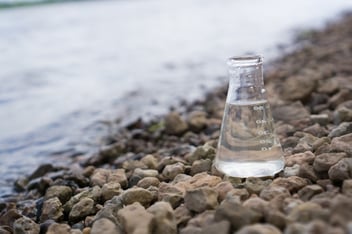Could the Sun’s radiation clean microplastics from wastewater and waterways?
Microplastics are a growing concern, and now an EU-funded project is looking at harnessing the sun’s radiation to help solve the issue.
The system will be trialled in homes and wastewater treatment plants to filter out microplastics from personal care products.
Exposure to sunlight can degrade plastics over long periods of time, but the KTH Royal Institute of Technology in Sweden has developed a method to speed up the process and make more efficient use of visible and ultraviolet light.
The method uses a filter coated with nano-sized semiconductors that initiate and speed up a natural process called photocatalytic oxidation. Similar to photosynthesis, photocatalysis activates the breakup of compounds by exciting electrons and causing water molecules to break down into their constituent parts: hydrogen and oxygen. Solar radiation captured by the filter is then used to create a reaction whereby the radicals exchange electrons with the atoms that make up the microplastics – effectively pulling them apart into harmless CO2 and water.
“The semiconductor material is able to excite the molecules and set off this process using the 40% of solar radiation that is visible light,” said KTH Functional Materials Chair Joydeep Dutta.
In a household, this filter system would be placed at the point where wastewater exits the home’s system. For a wastewater treatment facility, the filters would be used to initiate microplastics degradation after the usual treatment process is completed.
The project will also deploy floating booms at river mouths in Europe to collect visible plastic waste. Ferry routes in Denmark, the Gulf of Lyon, Ligurian Sea and Saronikos Gulf will also be used to test a microplastics measuring system that could be deployed on shipping vessels.
“These plastics will start accumulating in the food chain, transferring from species to species, with direct adverse consequences to human populations. Tackling plastic pollution at its source is the most effective way to reduce marine litter,” Dutta said.
Related podcast:
https://omny.fm/shows/australianwater/wilson-xu-on-detoxing-our-waterways

